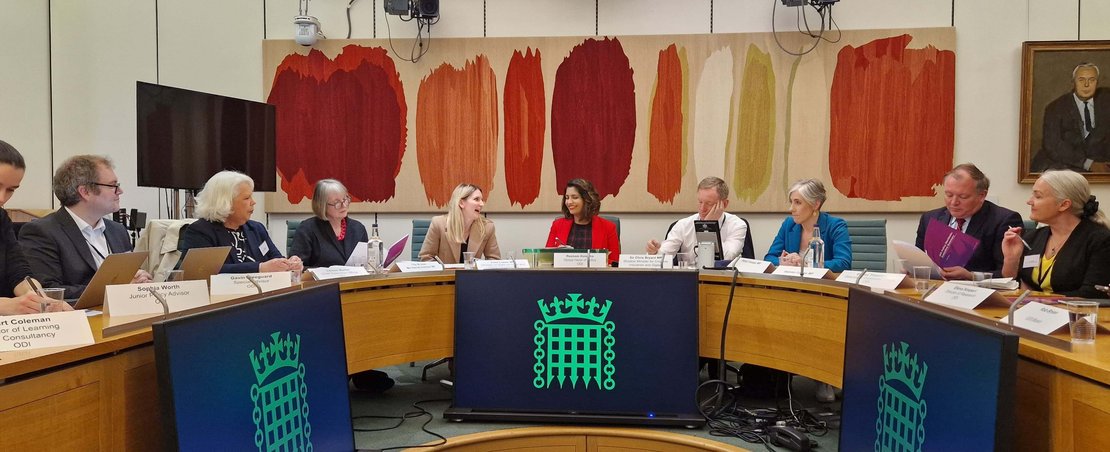
With a general election fast approaching—it has to happen by 28 January 2025 at the latest and will probably happen in autumn 2024—manifesto season will soon be upon us. Political parties will publish their policy pledges for what they would do in government, while campaigners and civil society organisations will publish their own wishlists and advocate for the inclusion of their policy ideas in party manifestos.
The Open Data Institute decided to get ahead of the game, launching our policy manifesto in Westminster on 20 March. We were delighted to be joined by a range of Conservative, Labour and Lib Dem members of parliament who gave their take on our manifesto – and their parties’ approaches to data and AI policy.
Data minister Julia Lopez opened by thanking the ODI for the manifesto. She still thought there was insufficient awareness of the importance of data issues.
The ODI is a very important organisation in bringing attention to issues around data – there is still insufficient awareness of their importance - I'm very grateful for the manifesto.
Minister of State for Data and Digital Infrastructure
Julia discussed the government’s Data Protection and Digital Information Bill, currently being debated in the Lords (you can read the ODI’s thoughts on the bill here), and how she hoped it would lead to a more agile data regime, able to adapt to fast-paced tech change. She highlighted the benefit of the UK being able to take its own approach to regulating data - having left the EU - while striving to maintain adequacy, where data flows can continue.
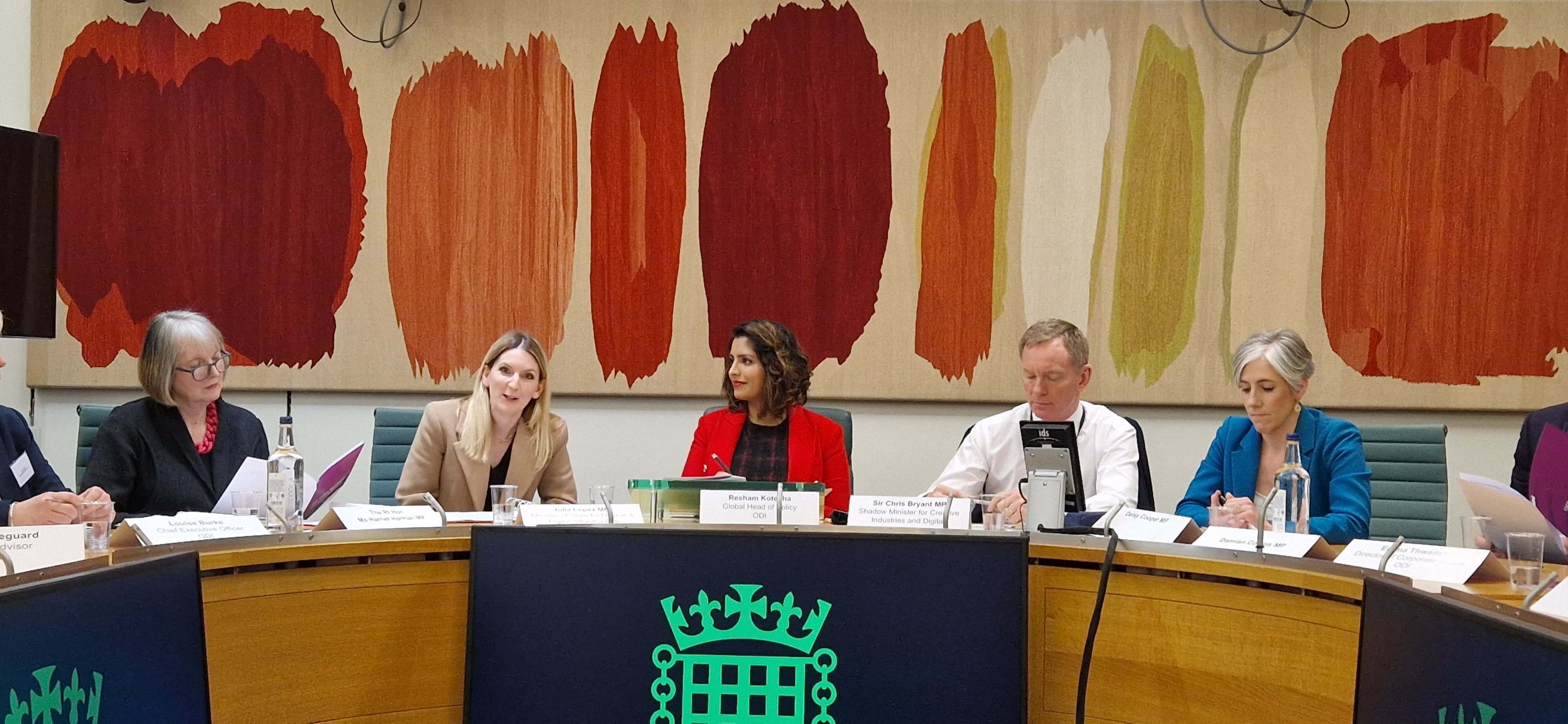
She agreed with many aspects of our manifesto, from the importance of strong data infrastructure to the potential of smart data schemes, building on the success of open banking. She underlined the importance of central and local government being educated on how to safely store and use data for the public good. She highlighted an example from a health data conference that morning, where the NHS had used data to target HPV vaccines to save lives. She finished by returning to the Data Protection Bill, saying it would support greater use of data for growth and innovation, make life better for consumers and do things differently to Europe while maintaining an ongoing relationship. She wanted to be ahead of the issues that will cause the public most concern, while ensuring data policy underlies the economy.
Labour’s shadow data minister, Chris Bryant, began by saying he thought the event might have been cancelled because an election had been called! Fortunately, we were able to successfully launch the manifesto and, as Chris put it, have the opportunity to have a hustings on data policy.
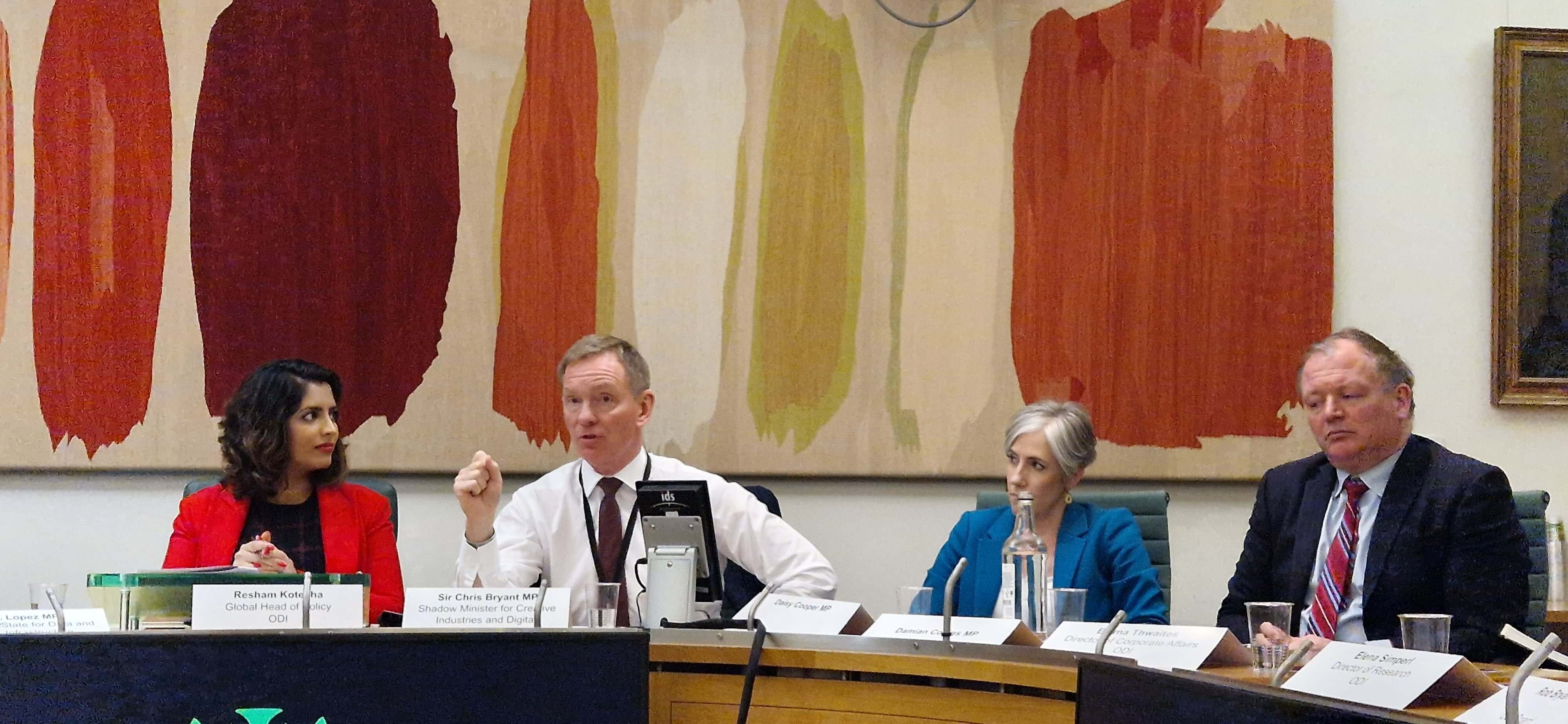
He said open, smart data was essential to the UK’s economic future – and economic growth was one of Labour’s key missions should it be elected to government. Given their focus on problem-solving and imagination, he included tech and IT within the creative industries - another part of his shadow ministerial brief. Chris set out his desire for all children to understand those industries and for those skills to be available to everyone. As he said, too many poor households still lack internet access.
The ODI have done a really good job bringing forward a manifesto which lays out the route to a much better system in the UK where you have trust in data and a national regime that allows you to succeed.
Shadow Minister for Creative Industries and Digital
He echoed Julia Lopez’s support for open banking – though he thought the government could have moved more quickly on building on this smart data scheme (our Global Head of Policy, Resham Kotecha, sits on the government’s Smart Data Council, and the ODI is a delivery partner for the Smart Data Challenge Prize). Chris highlighted how data has changed the way we look at cancer, though the NHS still relies on legacy IT systems, and there is much work to do. He underlined that trust in whatever regime there is for data really matters – and worried that the Post Office Horizon scandal had concerned people about a world run by tech and data; who owns people’s data, is monetising it, and selling it. While ‘lots’ of the Data Protection Bill is ‘great’, there were some things that didn’t belong and could damage trust, such as DWP powers to access bank account data on benefit claimants and political advertising rules. He also mentioned the need for every industry to protect its intellectual property in the age of AI, worrying that the UK was falling behind and that early regulation is important.
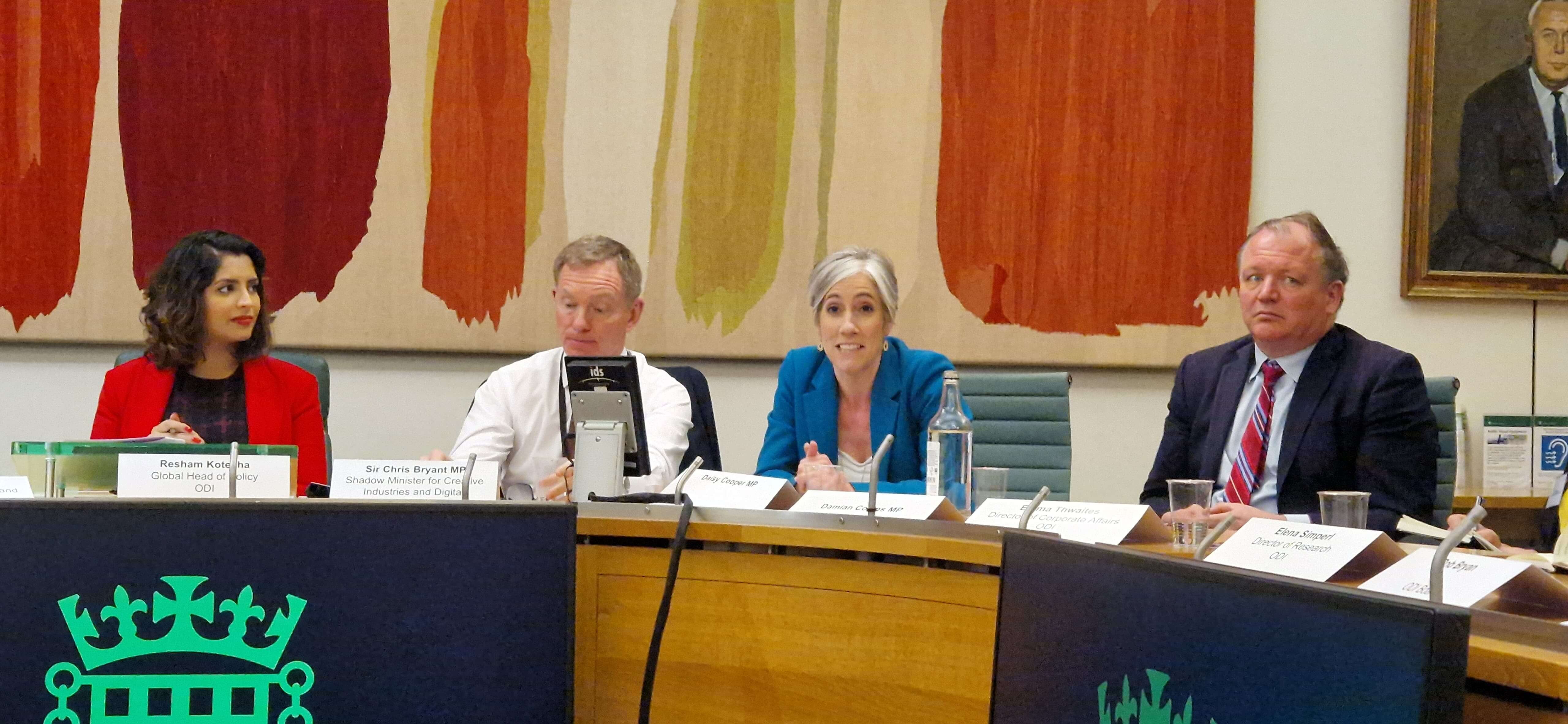
Daisy Cooper, deputy leader of the Liberal Democrats, had prepared by Googling recent stories on data, finding stories about the use of data in elections, deficient Home Office databases, and the Bank of England struggling to make decisions because of inadequate data. She highlighted the myriad of stories about inadequacies in data collection and processing. As a liberal, she emphasises that her starting point is the individual and set out her belief that there is a need for a digital bill of rights, including legal rights on access, privacy and ownership, data trusts and portability.
Data infrastructure, data policy, building trust, data trusts are all really important. The ODI manifesto is absolutely spot on.
Deputy Leader of the Liberal Democrats
Daisy is particularly interested in data in health - given her additional role as Lib Dem spokesperson for Health and Social Care, including the idea of ‘the genius and the gap’. She explained this by stating that there are some genius uses of technology - AI in radiotherapy for example - and then a massive gap, for example hospitals using paper records. Such cases speak to the importance of the ODI’s manifesto. She noted problems with data gaps and transparency around data on ambulance delays; sexual misconduct in the NHS; a complete lack of consistency and uniformity in how data is collected, showing the basic infrastructure doesn’t exist; GP waiting time data, which is experimental and doesn’t tell us what is going on; and the Federated Data Platform, which could be powerful but highlights cultural problems. For example, someone who is a data controller for 20,000 patients may be very nervous about giving access. These examples show the importance of data infrastructure, data policy, and building trust – the ODI manifesto is ‘spot on’, she said.
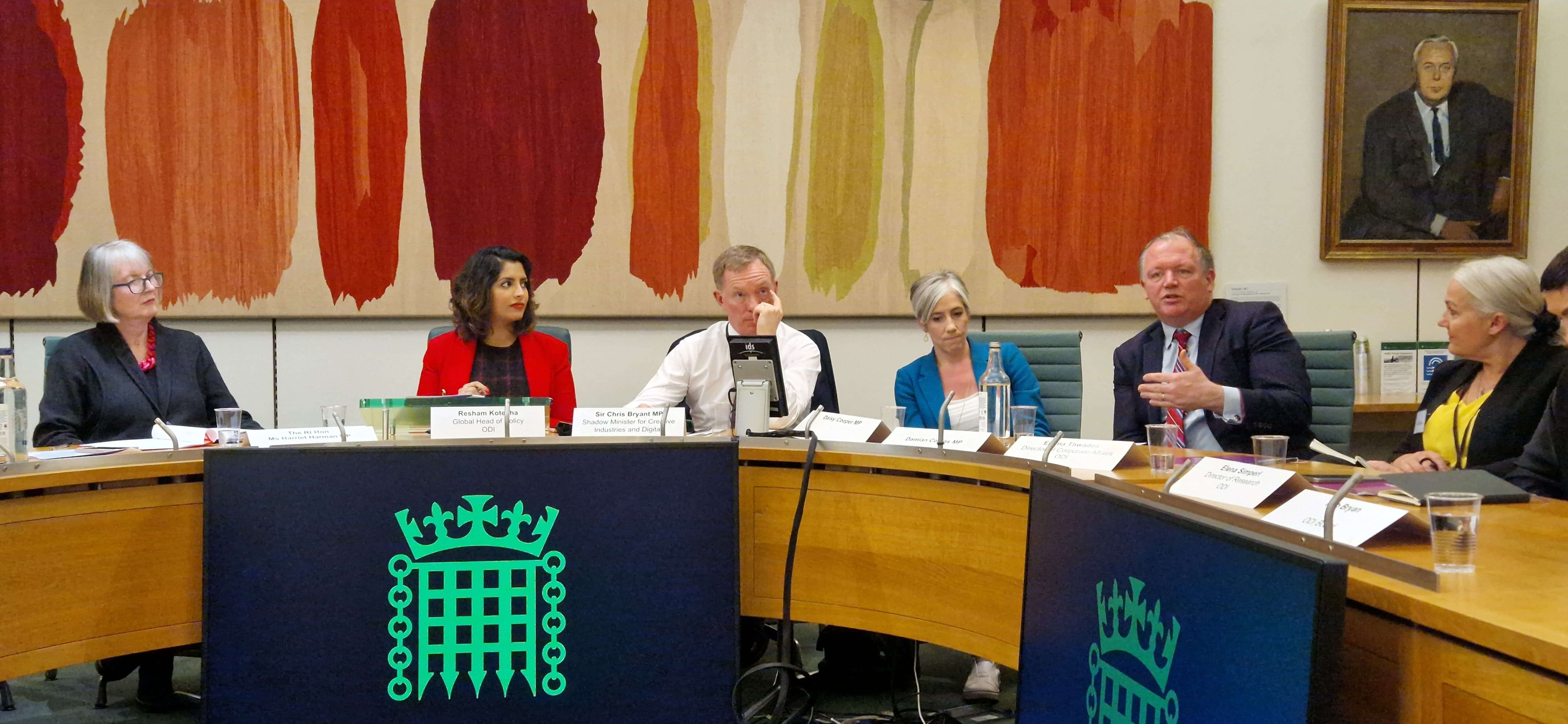
Damian Collins, Tory MP and former tech minister and former Department for Digital, Culture, Media and Sport (DCMS) select committee chair, congratulated the ODI on ‘an excellent piece of work’. He felt a lot of tech issues were converging around the use of data, with citizens concerned about how their data is used. He explained that while the public sector holds lots of data, it doesn’t use it efficiently – he believes that it’s not about having to gather more data but using it more effectively to transform how the public sector operates. In areas like health, there is a lot of support from citizens for using data and AI but data breaches are concerning, as is use in ways people don’t expect. Being clear about how data is used and allowing people to opt-out is important, he said. He recounted a presentation from the Estonian government, where a service just needed to know if someone was a local resident – it didn’t need the full address – and citizens could see how agencies were using their data, and could opt-out.
Congratulations on the manifesto, an excellent piece of work as there are so many issues converge around the use of data. Lots of citizens are concerned about how their data is used – and the public sector could be much more efficient about how it uses data and transform the way it operates.
Former Minister for Tech & the Digital Economy
Damian set out that the big question for artificial intelligence is safety. Social media is the best live demonstration of data for most of us – the Online Safety Act principally regulates AI-powered recommendation tools, and most of our experience is content being selected for us. The AI is given the task of holding a person’s attention for as long as possible and, in addition, monetise the attention of the user. Damian stated that this is fine where we have benign interests but posed the question, “what about a teenage girl with an interest in self-harm content?” Algorithms will hold her attention for longer and longer by showing her more self-harm content and more damaging content that could have serious mental and physical ramifications. He put forward further questions: “What is data being gathered for, how is it being used, who is responsible, and where is the human in the loop?” Damian said that where AI supports innovation, we need guardrails; we need to understand the risks. The guiding principle behind AI policy should be that AI can’t be used to break the law or cause appreciable harm.
Harriet Harman, Labour MP, mother of the House, former minister, shadow minister and select committee chair and introducer of the Equalities Act, started by thanking the ODI for its ‘increasingly important’ work, noting politicians need their hands holding through this period. After recounting some of the content Instagram’s algorithms were serving her – women from the US Midwest homeschooling eleven children, loving God and baking their own bread – she said our public policy stance has to be to have AI succeed. This is true for public services facing ever-increasing demand with restrained resources and for the private sector and its much-heralded productivity problems. For AI to succeed, though, the government needs to back this up with an AI workforce strategy to ensure people are coming through with the skills to use and apply AI.
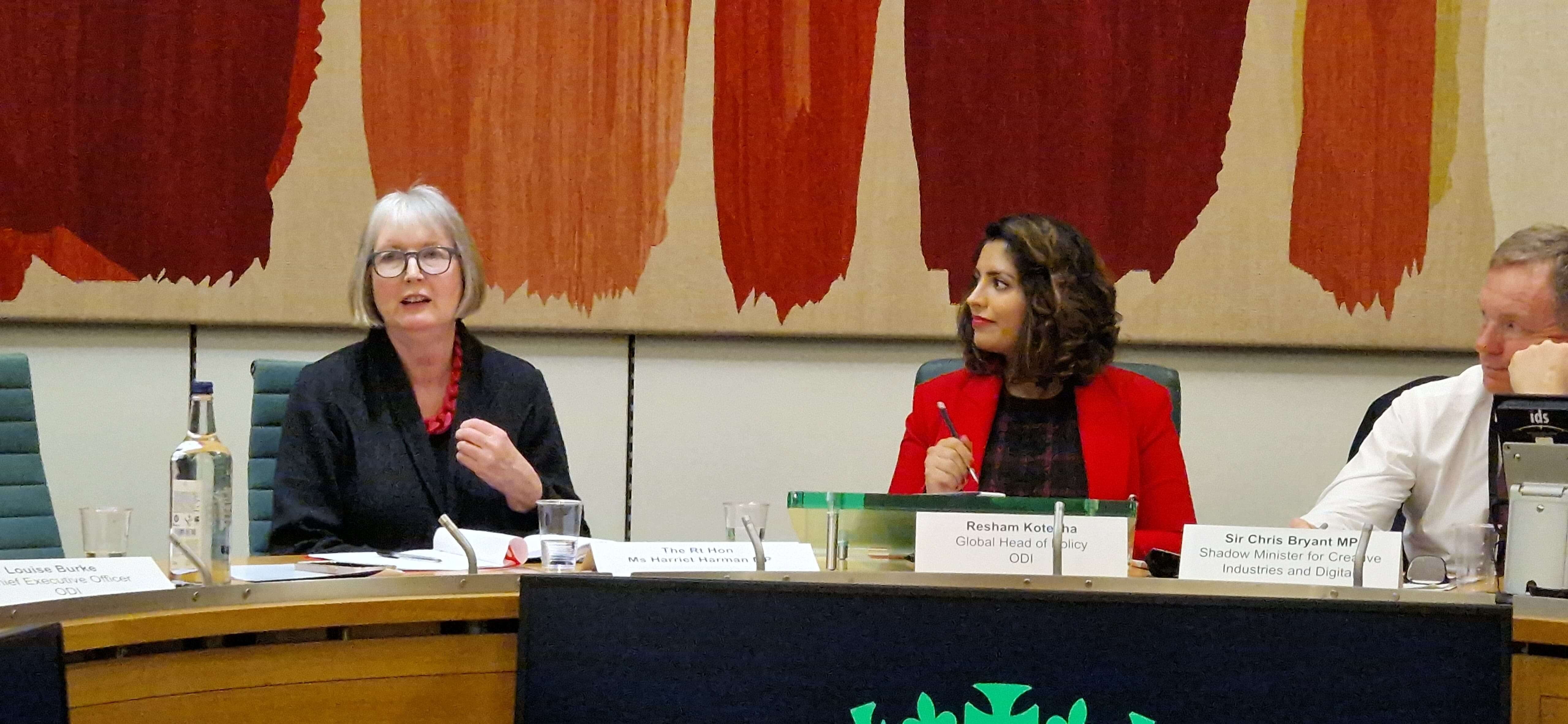
Harriet also said we have to be concerned that the benefits of AI are delivered for everyone as a public policy objective – that means development not being dominated by men only, but instead using the talent pool of the whole country. She noted attitudes were also an issue, citing Fawcett Society research saying one in five men working in tech thought women lacked the right propensity and ability to work in tech (Harriet is chair of the Fawcett Society). She explained that we should be concerned about AI and its potential impact on democracy, sharing that she had sent her sister a birthday message purporting to be from Joe Biden - and no one could tell it wasn’t real. As well as being aware, and combating the negative potential, of AI, we could also leverage the positive – for example, using AI to support electoral registration (the ODI’s Global Head of Policy, Resham Kotecha, and Director of Research Prof. Elena Simperl have written about the potential impact of AI on democracy. You can read the piece here). At the moment, there is a huge equality issue in who doesn’t register to vote and a skewed electoral map. Harriet highlighted the positive impact AI could have in adding millions of missing voters to the database.
Thanks to the ODI and your increasingly important work – we need hand holding as issues around data become more urgent. I strongly support the ODI's guiding principles - every single one of them underpin and reinforce our need to make sure that we end discrimination from AI and datasets. That's what's going to make it trusted, that's what's going to make it work properly.
Mother of the House and Former Minister for Tech
Harriet hoped ODI leadership would get us to the right principles and noted everyone was speaking very fast because we have to be fast. She noted there had been a full ten years between David Cameron first announcing action on online safety to Royal Assent on the Online Safety Act, illustrating the growing gap in rapidity of tech development and the pace at which we can regulate. One approach has been to say parliament is too slow, so let the executive do it. The problem with this is that the government should be accountable to parliament. Another is to leave it to the regulators – but that would leave them making policy decisions of profound importance when it should be their job to implement. It should be parliament making these decisions, she added, but it cannot be at the current pace when things are ten years out of date by the time they see the light of day. We should change parliamentary processes, tooling up select committees and empowering them to regulate on behalf of parliament (you can read more about Select Committees and Joint Committees here). Their members would reflect the balance of the House, doing it on behalf of the whole House, a potential solution to problems of rapidity and legitimacy.
This triggered fascinating debate on the best way to change parliamentary processes with Damian expressing his view that Select Committees are not only already overburdened, but that they can be too easily distracted by current affairs. He thought establishing a new joint committee would be a more effective and efficient way to speed up the legislative process. Chris’ view was that the most important update would be to make secondary legislation amendable (you can read more about secondary legislation here). Currently, secondary legislation is used to fill in the details in Acts of parliament (primary legislation) with little scrutiny, or Acts take a while to move through parliament - this adaptation would make it much quicker and easier to adapt previous legislation. Daisy agreed that amendable secondary legislation would be hugely beneficial to speeding up Parliamentary processes, and also suggested that ‘pre-regulation’ - allowing regulators to get on with regulating and recommending an approach to parliament - could be an additional improvement.
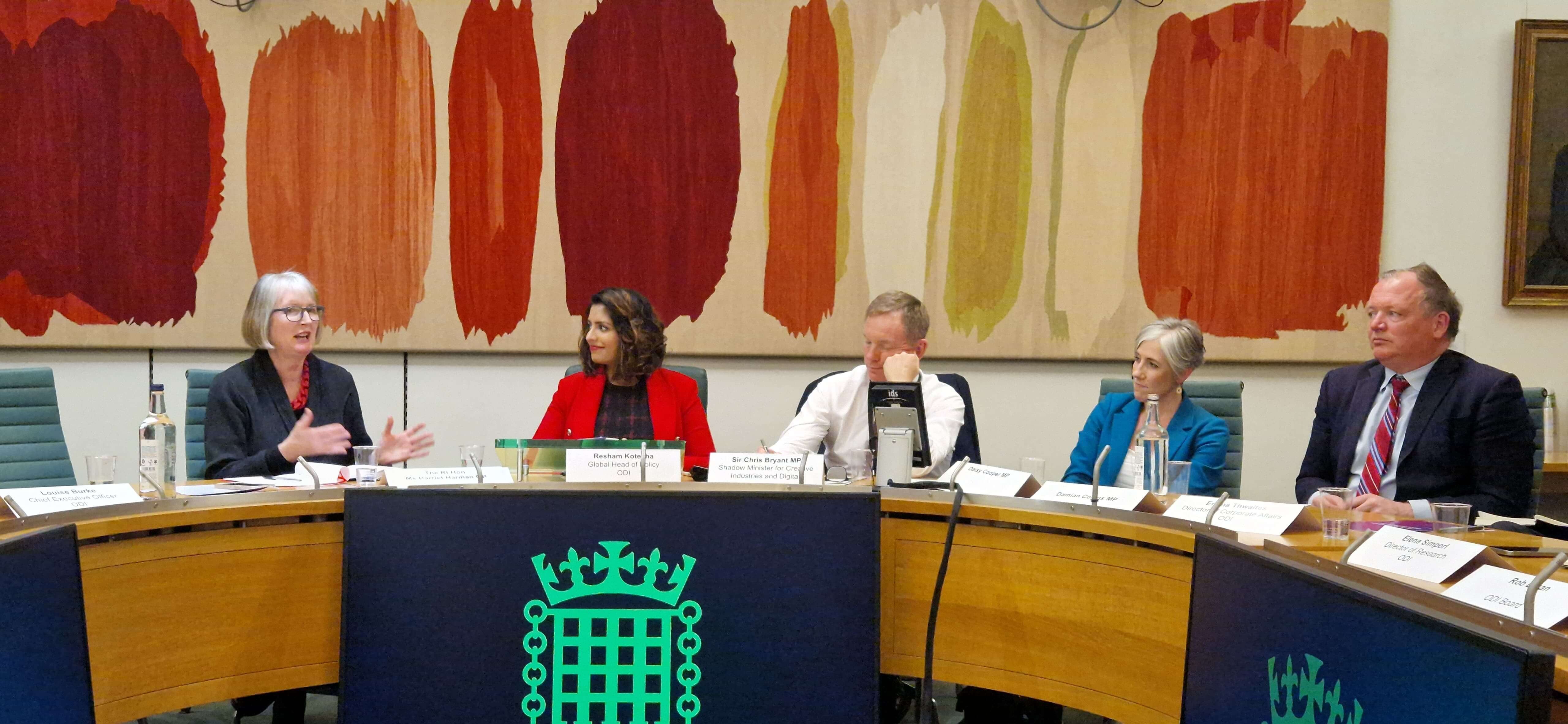
Questions from the audience covered topics as wide ranging as the risk of monopolies in AI and cloud data infrastructure and the undue influence these tech companies have, to digital inclusion and the need for data standards and interoperability. At the ODI, we were particularly thrilled to hear these questions as we feel strongly that for a healthy and robust ecosystem, we need to empower civil society and independent, trusted organisations to balance big tech and monopolies - and we know that data standards and interoperability would be hugely valuable in releasing the power of data.
Chris strongly believes that there needs to be a cross-party approach to AI legislation and that Ministers need to be in post for much longer than in recent years to enable long-term planning on legislation. He and Daisy both agreed on the importance of digital inclusion and digital and data literacy and on the need to update the government’s digital inclusion strategy.
Further audience questions asked the speakers about whether they believed there was a “trickle down” or “public benefit” to datasets and how the UK’s data and AI priorities tied in with international priorities and legislation.
Daisy expressed her belief that a digital bill of rights could create both interoperability, and benefits to both individuals and the public - so long as the data collection and use was non-traceable and protected. Her belief was that an industrial strategy that included data would support creating public benefit from datasets. With regard to international priorities, Chris stated his desire to ensure that the regulatory divergence from the EU was not so large as to impose challenges on British businesses having to follow two regulatory schemes - especially as EU adequacy is so important for our economy.
The event ended with a final question on the role of civil society—to support public services and underpin the foundations of democracy.
Harriet spoke passionately about the importance of civil society organisations being able to challenge Ministers, present experiences from the frontline, and provide expertise. Chris set out that a Labour Government would emphasise the role of civil society - and that they would be particularly keen to have civil society involvement to tackle issues around struggling public services, and biased data that might negatively impact marginalised groups. Daisy agreed with the importance of involving civil society and always asking, “who isn’t in the room?” as a valuable method for tackling biases and exclusionary policy.
We were delighted to receive cross-party support for our policy manifesto and to hear senior Parliamentarians talk so passionately about data standards and assurance, the need for strong data infrastructure with open data as a foundation, and the importance of trusted and independent organisations such as ours that can contribute meaningfully to a diverse, equitable, and robust data ecosystem.
Ahead of the general election, we would like to see all political parties engage with these themes and recognise their importance as foundational for building a thriving data ecosystem—and, with it, a thriving AI ecosystem that benefits people, the environment, and the economy.


